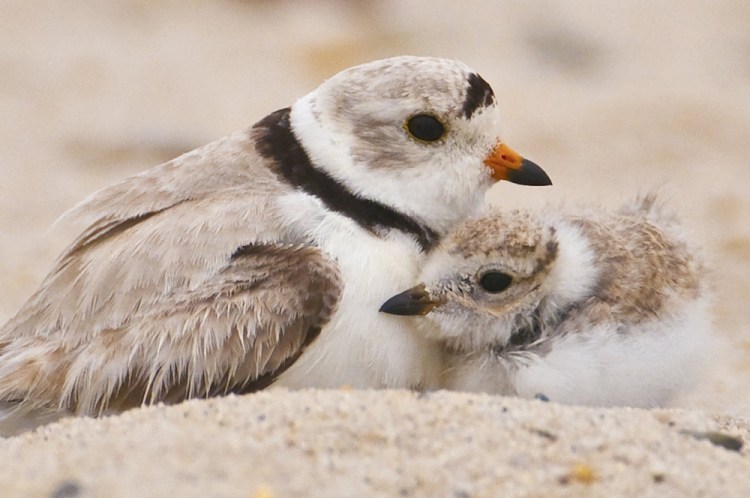The first piping plover nests of the season have been spotted on beaches in Kennebunk, Kennebunkport and Old Orchard Beach.
Piping plovers, which nest on sandy beaches from spring through late summer, are protected as endangered in Maine and as threatened under federal law. They are known to nest along the Maine coast from Ogunquit to Georgetown.
Last year, 62 plover pairs – the most in the state since 2004 – raised 121 chicks to the age of flight, or fledgling. The 121 fledglings represent the second-highest number since monitoring began in Maine 30 years ago.
“When the piping plover was protected under the Endangered Species Act back in 1986, just 15 breeding pairs survived in Maine,” said Mark McCollough of the U.S. Fish and Wildlife Service. “Thirty years later, the future is much brighter with a population of over 60 pairs. With continued support from coastal communities, we believe we can achieve recovery goals for these little beach-nesting birds.”
Once found throughout the Atlantic coastline, piping plovers are shore birds that measure just 7 inches long and weigh a mere 2 ounces as adults. Today the birds are listed as “threatened” under the federal Endangered Species Act and “endangered” in Maine because of a combination of habitat loss, past human hunting and predation from other animals.
Roughly 2,000 piping plover pairs nest on beaches from North Carolina to Newfoundland. The tiny birds can be spotted skittering at the ocean’s edge or on mudflats searching for worms, bugs and other invertebrates. When they aren’t foraging, plovers can be found nesting in the transition area between dunes and the sandy beach. Plover chicks are so small they are often described as cottonballs walking on toothpick legs.
The towns of Wells, Ogunquit, Old Orchard Beach and Scarborough have established cooperative beach agreements with the wildlife agencies and the Bureau of Parks and Lands to protect plovers.
“Maine beaches are special places for people and for plovers,” said wildlife ecologist Laura Minich Zitske of Maine Audubon. “By following some specific steps on beaches with plovers, beachgoers play a critical part in conserving this delicate shorebird.”
The Maine Aububon says beachgoers can help by respecting all areas fenced or posted for protection of wildlife, watching plovers from a distance without disturbing them, following local pet ordinances and taking trash and food scraps off the beach.
Send questions/comments to the editors.



